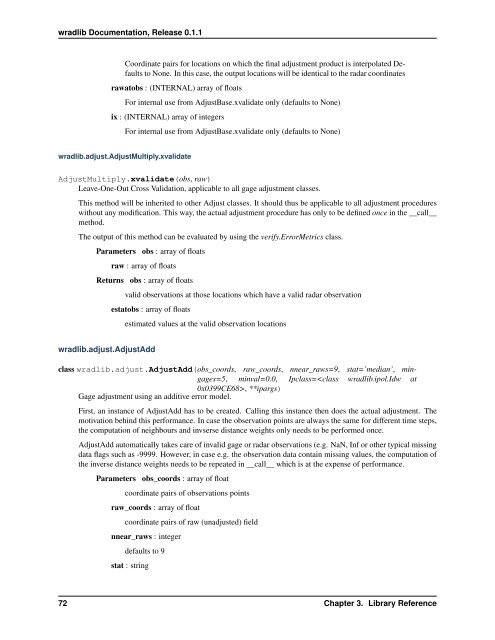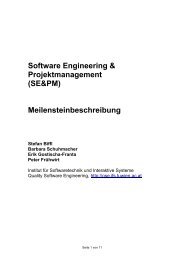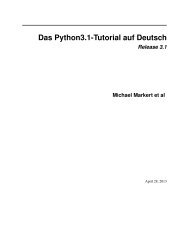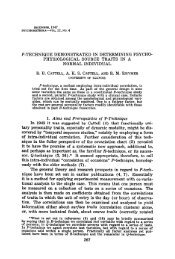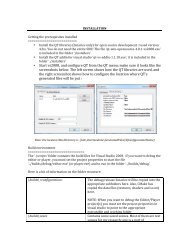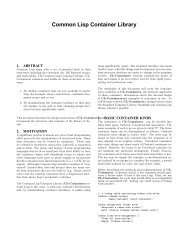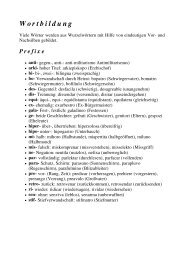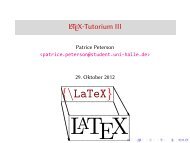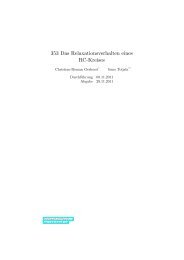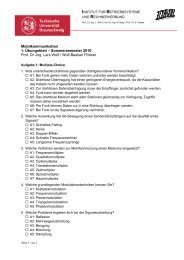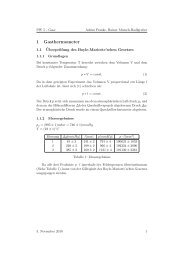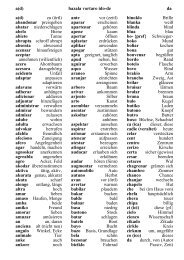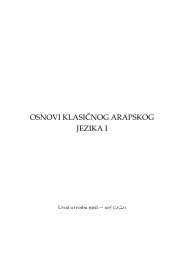wradlib Documentation - Bitbucket
wradlib Documentation - Bitbucket
wradlib Documentation - Bitbucket
Create successful ePaper yourself
Turn your PDF publications into a flip-book with our unique Google optimized e-Paper software.
<strong>wradlib</strong> <strong>Documentation</strong>, Release 0.1.1<br />
Coordinate pairs for locations on which the final adjustment product is interpolated Defaults<br />
to None. In this case, the output locations will be identical to the radar coordinates<br />
rawatobs : (INTERNAL) array of floats<br />
For internal use from AdjustBase.xvalidate only (defaults to None)<br />
ix : (INTERNAL) array of integers<br />
For internal use from AdjustBase.xvalidate only (defaults to None)<br />
<strong>wradlib</strong>.adjust.AdjustMultiply.xvalidate<br />
AdjustMultiply.xvalidate(obs, raw)<br />
Leave-One-Out Cross Validation, applicable to all gage adjustment classes.<br />
This method will be inherited to other Adjust classes. It should thus be applicable to all adjustment procedures<br />
without any modification. This way, the actual adjustment procedure has only to be defined once in the __call__<br />
method.<br />
The output of this method can be evaluated by using the verify.ErrorMetrics class.<br />
Parameters obs : array of floats<br />
raw : array of floats<br />
Returns obs : array of floats<br />
valid observations at those locations which have a valid radar observation<br />
estatobs : array of floats<br />
estimated values at the valid observation locations<br />
<strong>wradlib</strong>.adjust.AdjustAdd<br />
class <strong>wradlib</strong>.adjust.AdjustAdd(obs_coords, raw_coords, nnear_raws=9, stat=’median’, mingages=5,<br />
minval=0.0, Ipclass=, **ipargs)<br />
Gage adjustment using an additive error model.<br />
First, an instance of AdjustAdd has to be created. Calling this instance then does the actual adjustment. The<br />
motivation behind this performance. In case the observation points are always the same for different time steps,<br />
the computation of neighbours and invserse distance weights only needs to be performed once.<br />
AdjustAdd automatically takes care of invalid gage or radar observations (e.g. NaN, Inf or other typical missing<br />
data flags such as -9999. However, in case e.g. the observation data contain missing values, the computation of<br />
the inverse distance weights needs to be repeated in __call__ which is at the expense of performance.<br />
Parameters obs_coords : array of float<br />
coordinate pairs of observations points<br />
raw_coords : array of float<br />
coordinate pairs of raw (unadjusted) field<br />
nnear_raws : integer<br />
defaults to 9<br />
stat : string<br />
72 Chapter 3. Library Reference


